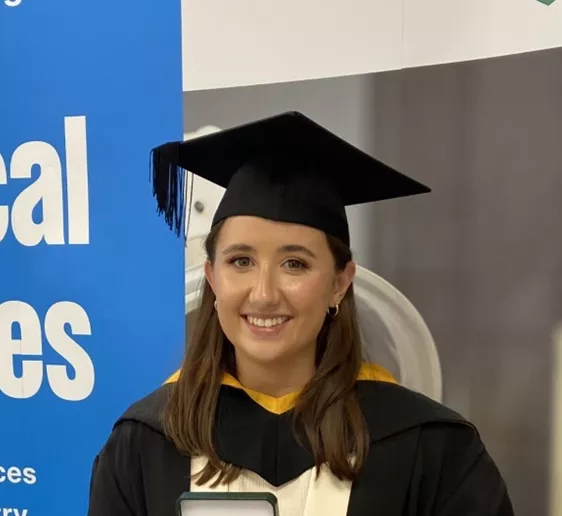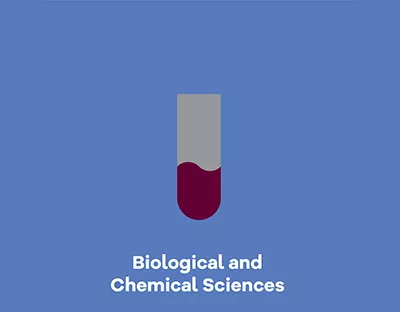Key Info
Bachelor of Science in Industrial Biochemistry
Entry route(s):
Are you interested in biological sciences and wish to delve deeper? Would you like to understand how living things work, evolve and function at the molecular level? Do you want to prepare for a future where molecular biology will be at the coalface of human endeavour? Then this course might be for you.
Why Study Industrial Biochemistry at UL?
The B.Sc. In Industrial Biochemistry is a degree programme in biotechnology. It focuses upon the study of living cells (or components of living cells) and the medical/industrial applications of such substances. It is designed to prepare you for a career in the biotechnology sector and allied industries and has a very strong employment record.
Examples of traditional biotechnological processes include the use of microorganisms to produce alcohol or antibiotics. Examples of more modern biotechnological processes include the use of genetic engineering to produce protein-based drugs or “Biopharmaceuticals” (e.g. Insulins or Interferons), engineered plants, which are drought or pesticide resistant or transgenic animals displaying some novel characteristic, such as faster growth.
The core subjects studied include:
- Biochemistry (study of the structure and biological function of cellular molecules such as proteins and DNA, and how these molecules interact to form living cells)
- Industrial biochemistry (study of the applications of biological molecules for medical, industrial, environmental, agricultural or analytical purposes)
- Microbial technology (study of microbiology and the uses of bacteria, fungi, yeast and viruses)
- Genetic engineering (identification, isolation, engineering and expression of genes in order to gain new insights into gene function or for the generation of gene-mediated industrial/medical products)
- Bioprocess technology (aspects of industrial-scale biotechnology manufacturing/processing)
- Analytical science (methods and techniques used to detect and quantify biological molecules/chemicals in samples, for example, measurement of hormone levels in blood or pesticide levels in water)
In addition to these, a number of other relevant subjects are also undertaken, including computing, chemistry, maths and bioinformatics.
Learn more about our courses and upcoming events
What you will study
The programme is of four years duration.The first year (through LM123 Common Entry) provides you with the required academic foundation in:
- Biology
- Introductory industrial biochemistry
- Computing
- Chemistry
- Mathematics
- Introductory physics
The second year builds upon these fundamentals, introducing you to courses in:
- Biochemistry
- Microbial metabolism and technology
- Bioprocess technology
- Analytical sciences
During the third and fourth years you will undertake additional specialised modules in biochemistry, genetic engineering, diagnostics, applied immunology and bioinformatics. In the final year a stream of elective modules allows the student to specialise in topics such as Biomaterials (new materials in the medical device industry), entrepreneurship, waste management and specialised biochemistry modules. A project, which is undertaken throughout the final year, allows students to analyse a problem in depth and, if interested in postgraduate research, gives you the opportunity to carry out an exploratory investigation of a potential research topic.
During the spring semester of year 3 and the subsequent summer, a period of Cooperative Education (student placement in industry) provides experience of the practice and application of industrial biochemistry in a working environment. Such relevant industrial experience, gained either at home or abroad, has proven particularly beneficial to students seeking employment in industry after completing their studies.
By the end of this course
You will have a deep knowledge of the concepts, facts and technologies that underpin industrial biochemistry. These areas include biochemistry, microbiology, genetic engineering, biotechnology and biochemical engineering. From here you will be very well placed to gain employment directly in industry, or go on to further studies, either within Ireland or internationally.
|
Year 1 |
Semester 1 |
|
Semester 2 |
|
CH4701 |
General Chemistry 1 |
BY4102 |
Biology for Biosciences |
|
BY4001 |
Biology 1 |
CH4102 |
Organic Chemistry 1 |
|
MA4601 |
Science Mathematics 1 |
PH4142 |
Introduction to PHYSICS |
|
CH4021 |
Laboratory Calculations |
MA4602 |
Science Mathematics 2 |
|
ER4011 |
Introduction to Environmental & Biosciences |
CH4031 |
General Chemistry 2 (INORGANIC) |
|
CH4051 |
Introduction to Applied Chemistry and Biochemistry |
CH4041 |
General Chemistry 2 (PHYSICAL) |
|
CS4131 |
Introduction to Scientific Computations |
|
|
| Semester 3 | Semester 4 | ||
| BY4013 | General Microbiology | BC4012 | Microbes as Metabolic Factories |
| BC4903 | Biomolecules | PT4004 | Introduction to Quality Management |
| CH4103 | Organic Chemistry 2A (1) | BC4904 | Proteins and DNA |
| CH4303 | Analytical Chemistry 1A | CH4304 | Analytical Chemistry 2A |
| MA4603 | Science Maths 3 | MA4604 | Science Maths 4 |
| Semester 5 | Semester 6 | Summer | |
| CG4003 | Bioprocess Engineering 1 | Cooperative Education | Cooperative Education |
| BC4705 | Industrial Biochemistry 1 | ||
| BC4905 | Genetic Engineering | ||
| CH4305 | Analytical Chemistry 3 | ||
| ER4627 | Safety and Industry |
| Semester 7 | Semester 8 | ||
| BC4011 | Bioprocess Engineering for Biochemists | BC4718 | Industrial Biochemistry 2 |
| BC4917 | Biochemistry Project 1 | BC4008 | Immunology and DNA Diagnostic Techniques |
| BC4957 | Bioinformatics | BC4918 | Biochemistry Project 2 |
| MA4605 | Chemometrics | BC4907 | Cell Biochemistry |
| Elective: | Choose 1 of following; | Elective: | Choose 1 of following; |
| ER4507 | Waste Management 1 | ER4508 | Waste Management 2 |
| EP4315 | Enterprise Formation | EP4408 | Small Business Consulting |
| BY4027 | Current Trends in Biotechnology and Regenerative Medicine | BY4048 | Advanced Cell and Molecular Biology |
| BY4037 | Pharmacology and Drug Development | BY4058 | Host Microbe Interactions |
Entry requirements
| Additional considerations |
Please refer to the entry requirements for |
|---|---|
| Non-EU Entry Requirements |
|
How to apply
| Where are you applying from? | How to Apply |
|---|---|
| Ireland | Irish students must apply to UL via the CAO. More information can be found here. |
| The UK | Students who have completed their A-Levels can apply to UL via the CAO. More information can be found on the Academic Registry website. |
| The EU | EU Students can apply to UL via the CAO. More information can be found on the Academic Registry website. |
| Non-EU country | If you are outside of the EU, you can apply for this degree here. |
Fees and funding
Student course fees are broken into three components - Student contribution, Student Levy and Tuition Fees.
A number of illustrative examples of fees for this course based on the current fee levels have been set out in the tables below.
An explanation of the components, how to determine status and the criteria involved is provided below the examples as is a list of possible scholarships and funding available.
EU Students with Free fees status in receipt of a SUSI grant
| HEA pays | Tuition Fees | €4,262 |
| SUSI pays | Student contribution | €3,000 |
| Student pays | Student Levy | €102 |
| Total | €7,364 |
EU Students with Free fees status not in receipt of a grant
| HEA pays | Tuition Fees | €4,262 |
| Student pays | Student contribution | €3,000 |
| Student pays | Student Levy | €102 |
| Total | €7,364 |
Students with EU fee status not in receipt of a grant
| Student pays | Tuition Fees | €4,262 |
| Student pays | Student contribution | €3,000 |
| Student pays | Student Levy | €102 |
| Total | €7,364 |
Non-EU Students
| Student pays | Tuition Fees | €21,798 |
| Student pays | Student Levy | €102 |
| Total | €21,900 |
Student course fees are comprised of the following components:
Student Contribution
Annual charge set by the government for all full-time third level students. All students are liable unless they have been approved for a grant by Student Universal Support Ireland (SUSI). Please refer to https://www.studentfinance.ie to determine your eligibility for a grant and for instructions on how to apply. The current student contribution is set at €3000.
Student Levy
All students are liable to pay the Student Levy of €102. Please note the Student Levy is not covered by the SUSI Grant.
Tuition Fees
These are based on Residency, Citizenship, Course requirements.
Review the three groups of criteria to determine your fee status as follows
-
Residency
- You must have been living in an EU/EEA member state or Switzerland for at least 3 of the 5 years before starting your course
-
Citizenship
- You must be a citizen of an EU/EEA member state or Switzerland or have official refugee status
-
Course Requirements
(all must be met)
- You must be a first time full-time undergraduate (Exceptions are provided for students who hold a Level 6 or Level 7 qualification and are progressing to a Level 8 course in the same general area of study).
- You must be undertaking a full-time undergraduate course of at least 2 years' duration
- You cannot be undertaking a repeat year of study at the same level unless evidence of exceptional circumstances eg serious illness is provided (in which case this condition may be waived)
Depending on how you meet these criteria your status will be one of the following -
- Free Fee Status: You satisfy all three categories (1, 2 and 3) and therefore are eligible for the Higher Education Authority’s Free Fees scheme.
- EU Fee Status: You satisfy both the citizenship and residency criteria but fail to satisfy the course requirements and are liable to EU fees.
- Non EU Fee Status: You do not meet either the citizenship or residency criteria and are therefore liable to Non EU fees.
More information about fees can be found on the Finance website
These scholarships are available for this course
| Title | Award | Scholarships Available |
|---|---|---|
| BD Science and Engineering Undergraduate Scholarship | €2,000 for one year | 6 |
| Chemifloc Ed Storey Scholarship in Chemical Sciences | €6,000 | 1 |
| Johnson and Johnson WiSTEM2D Programme |
These scholarships are available for all courses
| Title | Award | Scholarships Available |
|---|---|---|
| All Ireland Scholarships - sponsored by J.P. McManus | €6,750 | 125 |
| Brad Duffy Access Scholarship | €5,000 for one year | 1 |
| Bursary for my Future Scholarship | €2,750 one off payment | 4 |
| Civic Engagement Scholarship | €1500 | 1 |
| Cooperative Education Award | 1 medal per faculty | |
| Elaine Fagan Scholarship | €1,500 | |
| Financial Aid Fund | ||
| Hegarty Family Access Scholarships | €5,000 for one year | 2 |
| Higher Education Grants & VEC Grants | ||
| Irish American Partnership Access Scholarships | €5,000 | 2 |
| Paddy Dooley Rowing Scholarship | €2,500 | |
| Plassey Campus Centre Scholarship Programme | ||
| Provincial GAA Bursaries Scheme | €750 | |
| Stuart Mangan Scholarship | ||
| The Michael Hillery and Jacinta O’Brien Athletics Scholarship | Various benefits equating to over €7,000 in value | |
| UL Sports Scholarships | Varies depending on level of Scholarship | Multiple |
Your future career
Employability skills from this degree
- Understanding complex biological processes
- Assembling arguments and engaging in debate
- Thinking independently and problem-solving
- Full and critical
- Critical, analytical and practical skills
- Numeracy
- Communication, presentation and IT skills
- Teamwork
- Self-management and professional development
Further Research Options
- PhD in a relevant research field
- Bachelor of Medicines, Bachelor of Surgery (Graduate Entry)
- Graduate Diploma in Chemical Engineering
- MA in Business Management
Job titles for graduates with this degree
Graduates progressing directly into employment take up a wide variety of roles. The following provides a sample of initial roles listed on the Graduate Outcomes Survey by graduates approximately one year after graduation:
- Biotech Production
- Manufacturing Technician
- Irish Research Council
- Laboratory Assistant
- Laboratory Technician
- Manufacturing Biochemist
- Process Technician
- QC Analyst
- Quality Officer
- Research and Development Analyst
- Technical Support
Student profile

Aoife Cotter
I chose to study Industrial Biochemistry at UL because I was impressed by the wide variety of modules and was aware of the growing Biopharmaceutical industry in Ireland. I felt the course would provide me with the knowledge and skills that I would need to have a successful career. In addition to this, Biology and Chemistry were my favourite subjects in secondary school, and I wanted to continue to study them at a higher level in college.
UL’s degree in Industrial Biochemistry provides students with brilliant hands-on laboratory experience, especially in Years 1–3. In Year 4, each student gets the opportunity to complete an individual research project and gets to choose from a wide range of interesting elective modules. This is a great opportunity to take ownership of your degree and it allows everyone to learn about topics that interest them most. The lecturers and technical support staff at UL are incredibly supportive and generous with their time. All these aspects of the course ensure students have a well-rounded degree.
My favourite experience at UL was my Co-op placement. I completed my eight-month Co-op placement in Regeneron’s Industrial Operations and Product Supply (IOPS) site in Limerick, where I was an intern in the Formulation and Filling team in the Large-Scale manufacturing department. I worked alongside biotech production specialists (BPS), who carried out the manufacturing process of biologic-based medicines in a cleanroom environment. In addition to supporting my fellow teammates, I was also given individual tasks, which included working on a continuous improvement project, reviewing documents, and submitting samples for analysis. I also had the opportunity to develop soft skills such as teamwork, communication, and troubleshooting. The entire experience re-enforced everything that I learned in my degree and highlighted its versatility.
Overall, I believe the key strength of this course is that students have a broad range of career paths available to them after graduation, including the opportunity to pursue postgraduate studies.
I am currently an Irish Research Council-funded Ph.D. student at the Bernal Institute, in UL.
Phoebe Makim
I always wanted to pursue a career in science but wasn’t sure what particular area to go into. I chose biological and chemical sciences at UL as it was a broad course initially, and gave me the option to specialize at the end of the first year. After my first year, I found I enjoyed biology and chemistry equally, so I chose the Industrial Biochemistry degree as it allowed me to continue to study both subjects.
I found the course very interesting and enjoyable. It covered a wide range of topics from statistics and bioprocess engineering, to microbiology and organic chemistry. The huge range of subjects the course covers, while still going into detail within each module, makes this course very attractive to people who enjoy learning about all aspects of biochemical science.
One of the most important opportunities this course provided me with was the Johnson and Johnson WISTEM2D Scholarship. I applied for the scholarship during my fourth year and had the honor of being chosen as one of the recipients. The scholarship program gave the recipients the opportunity to attend different seminars run by women in various roles within the STEM community. One of the main events held by Johnson and Johnson as part of the program was a tour of the facilities in Castletroy. Myself and the other recipients were given opportunities to ask questions regarding the possible careers open to us at J&J. I’m so grateful to UL and all those at J&J for that amazing opportunity.
The eight month Co-Op placement allowed me to further develop the skills I had learned in university in an industrial setting. I was able to put my analytical skills to the test when working in a quality control laboratory in Regeneron Pharmaceuticals. My time in Regeneron provided me with invaluable training and experience and also gave me the opportunity to continue to work part time with the company while continuing my studies in fourth year, allowing me to continue to learn new QC testing methods that I could use later on in my career and during my final year project.


Roisin Leamy
I always had an interest in science and wanted to pursue a career in this field, however, I was unsure which scientific course would suit me. The BSc in Industrial Biochemistry seemed like the perfect fit as it had a common entry first year and gave you the option to choose one of four routes for the remaining three years. In the first year, a taster of each course was provided, which was critical in deciding which path to take.
The course was very interesting, every day was different and brought new challenges. I particularly enjoyed the Biochemistry 1 & 2 modules as they provided the necessary link between academia and industry. They gave the opportunity to understand the science behind the production of biopharmaceutical products on both a small and large scale. These modules challenged us to think for ourselves and design realistic production processes based on the information provided.
For my Co-Op work placement I went to Regeneron, a Biopharmaceutical company in Limerick. Co-Op allowed me to apply the knowledge gained in academia to industry. I was given the opportunity to deliver a presentation to the Vice president and all the directors. I was a chosen ambassador for the company following my placement and attended career fairs promoting Regeneron. I was also offered a full-time position following the completion of my degree!

